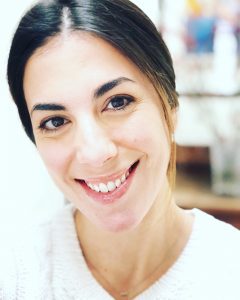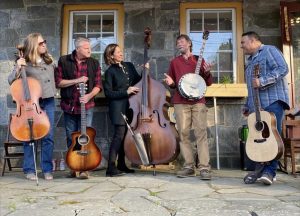
In consideration for the hard work of Amanda Abbott, which deserves a celerity from this piece (so as to not deter potential audience members) that I will be unable to give it, I shall begin with the most important material facts. Abbott will be directing a production of “A Midsummer Night’s Dream” that will be performed in Chester, Connecticut on Tuesday, June 21, 2022, from 7 – 9 pm. It shall take place in a garden amphitheatre, as befitting the play, and shall be accompanied by music. Abbott aims to dissolve boundaries and bring together the community with her production, and I have complete faith she will be successful.
Further information is available at this link
Or on Abbott’s Instagram page: @a_e_abbott
It has long been the ambition of art to tame the Dionysian elements of life, capture them in cages– pictures, plays, pages– with a firm wall between the delicious chaos and the safe spectators. Thus, the entirety of the west has compartmentalized our savage pleasures; like Caesar in Alesia, we have encircled our target and walled ourselves jointly from the rest of the world. Our resultant capture of these elements is absolute, isolating them– and ourselves– from the greater Dionysian world. But who will take down these walls when the Dionysian within withers and the Dionysian beyond laughs in scorn– for laughter is the great legacy of Dionysus Eleutherios.
Sculpture, like wall-building, is a reductive and an additive process. We must trade possibility for reality with each chip of the marble, each stroke of the pen, to impose our thoughts on an indifferent world. There are two arts immune to immutation, impervious to imperfection, that are themselves not products, but productions; they are music and theatre. The former began its death in 1860, the latter in 1888, but the former has proven itself far more resilient to the neverending Apollonian siege of mankind. Perhaps this is because dance is the final Dionysian, pagan ritual– a refusal to succumb to the Apollonian heartbeat of song and a mockery of the social dynamics considered inviolable during the day. Perhaps, as such, dance is the great defender of music, so that even with thousands of performances digitally captured, we are still desperate to see music live. And live it does; as performers live, so too does music float from mind to mind, coming when called, but never dismissed so easily. A concert is a communal ritual to Music herself, for ceremony and celebration is best done in cooperation.
Theatre, however, has followed the path of orchestra and opera– those sedentary musics– into an almost total Apollonian arrest. Stasis has a natural foothold in these arts, an advantage which technology has pressed, as it has in every non-participatory art, to displace these into devices in the audience’s homes. This keeps us superficially happy, superficially cultured, superficially social– there is a market for keeping us such and keeping us such sustains the greater market. However, the specific causes for man’s Apollonian march towards utter iconography is beyond the scope of this essay, and it will suffice to use this march as its own cause while considering the death of art.
The best part of a traditional play is intermission. I hope you don’t take me as a philistine for saying so; I shall offer an illustration: a main character dies on stage, the lights fade, the tension is ripe, the curtains close, the audience erupts in applause, then simmers down as light envelops them, small, hushed conversations spring forth like a babbling brook, then grow emboldened, people rise, you chat with your companions and the conversation carries you out the door, you order a $20 cheese plate in the lobby– you’re feeling ostentatious, even theatrical– you eavesdrop on other conversations, you imagine yourself hiding behind a garden wall while doing so, you spontaneously interrupt someone’s conversation, it’s uncouth, but (again) it’s theatrical and we all appreciate that here, don’t we? But soon the magic fades and the stage calls us all back– you and me and our new friends– and the scene plays in reverse, the audience settles and lights fade then the stage bursts to life and intermission is over. Intermission reigns supreme in traditional theatre because no mere spectacle can compare to even the dullest ritual.
Thus far I have briefly discussed the nature of art and her current subverted position in our society, differentiated between performance and non-performance art, and explained in more detail the state of performance art within this schema by contrasting music and theatre. However, this is a newsletter for the Connecticut Writing Project, not my personal diary, so eventually I must quit my sophistry and discuss an exciting enterprise within these spheres that will be taking place in Chester, Connecticut on the Summer Solstice.
When our earth’s ellipse nears the sun, that great beacon of Appolonian power, perhaps it is only natural for humans to rebel. Does heat dissolve boundaries? Does it remind us of our own powerlessness? Does it defy us to spit in its face? Whether we’re driven mad by Apollo or are merely driving Him off with Dionysian displays, Midsummer Night has long been a cause for celebration. Shakespeare understood this well; A Midsummer Night’s Dream transcends boundaries, as dreams and festivals always do. Drawing heavily upon pagan inspiration, Shakespeare illustrates the power of nature and her providence, love, in dissolving societal boundaries. Supernatural forces intercede into the daily struggles of humanity, flinging us towards utter despair before lifting us up towards salvation. Greek tragedy tells us of our impotence in the face of Fate and comedy has long informed us of our relative power in self-destruction. Shakespeare’s play redeems levity, subdues tragedy, and offers a resounding assurance of human resilience.
Amanda Abbott has devoted much of her life to the study of Shakespeare’s works, and only a full biography– for which I have neither the time nor skill– would do her credit. My impressions are that she is as passionate a character as Shakespeare has ever devised: she dreams so nobly and unapologetically that not only will she sway her audience, but Titania and Oberon themselves might smile upon the production.
Abbott aims to bring together a cast of all ages, from all walks of life– those who might otherwise pass by each other on the street– to perform. Casting like such shows blatant and admirable disregard for the societal lanes we walk in, the expectation that our journeys run parallel to time itself, which never has and never will be the case. Moreover, Abbott takes no heed to the gender of characters while assigning roles; as Shakespeare assigned roles exclusively to men, Abbott assigns exclusively to people.
These actors will be performing in a garden amphitheater, on a historic hotel property. The stage is custom-built by Leif Nilsson, who has long used the space as the venue for his band. He is the reason I have placed such a focus on music in the introductory philosophy of this article, and I shall return to the topic of his music later. For now, the venue is of particular interest due to its connection with nature and lack of formal structure. The former calls to the very heart of the play, and indeed it feels improper to watch A Midsummer Night’s Dream from parallel rows of metal seats in some boxy theatre. Against traditional concepts of theatre, which aim to separate the play from the realm of so-called distractions, the actors won’t be competing with nature for the audience’s attention; rather, the two will be collectively beckoning us from the mundane sterility of modern life. If all the world’s a stage, then why not let your stage be all the world, all of nature in her chaotic beauty? So asks Abbott, through her choice of venue.
As is appropriate given the exceedingly Greek nature of the play, Amanda Abbott and Leif Nilsson have given music back to the playwright, echoing ancient Greek choral refrains. Leif and his band, Arrowhead, take on the roles of the mechanicals, infusing their folk music into the play itself. Folk music, a great beacon of musical storytelling, is a communal art that pulls stories from their pedestals. This genre is often bawdy, tragic, or uniquely both, and there could be little doubt that it is perfectly thematic for Shakespeare’s play. By giving the audience music from the mouths of mechanicals, Leif and his band will draw them further into the story and further from their seats. Such a force, evenly applied to the audience and actors alike, becomes one of unification, as music is in any context. By filling the mechanicals’ roles with music, Abbott and Leif ground the story in the elevation of the common man, even in the face of gods, and utilize the full power of performance to defend Shakespeare from the immobility that modernity maligns him with.
In explaining her work, Abbott referred me to a quote from James Baldwin’s Why I Stopped Hating Shakespeare, about the responsibility of a poet to his audience, which follows:
“And his responsibility, which is also his joy and his strength and his life, is to defeat all labels and complicate all battles by insisting on the human riddle, to bear witness, as long as breath is in him, to that mighty, unnameable, transfiguring force which lives in the soul of man, and to aspire to do his work so well that when the breath has left him, the people — all people! — who search in the rubble for a sign or a witness will be able to find him there.”
But such is the responsibility of all artists, and one that Abbott shoulders well while directing. I have considered not including Baldwin’s quote because the very fiber of Abbott’s work is such that it shouts this sentiment in every detail– the casting, venue, and music each defeat labels and complicate battles– but it was of such note to her that I cannot omit it. This performance will defy preconceptions of age, gender, history, staging, Shakespeare, and– I dare say– of theatre itself! By crossing the boundaries of our society, Abbott will create an immersive and communal theatre experience, uniting actors and audience in celebration of love, nature, and humanity, and in defiance of convention, preconception, and categorization.
Amanda Abbott has said to me that “it is in our nature to learn about ourselves through storytelling.” She certainly has much to teach us– and indeed she is eager to learn– through her directing of Shakespeare’s A Midsummer Night’s Dream. To capture my overall enthusiasm for her project (it would be impossible to capture even a fraction of her own), I must rely on a phrase she uses with every correspondence– “Huzzah!”
Huzzah for theatre!
Huzzah for music!
Huzzah for Shakespeare!
And Huzzah for the daring director Amanda Abbott!

Arrowhead, the band that will play the parts of the mechanicals and accompany the production.

